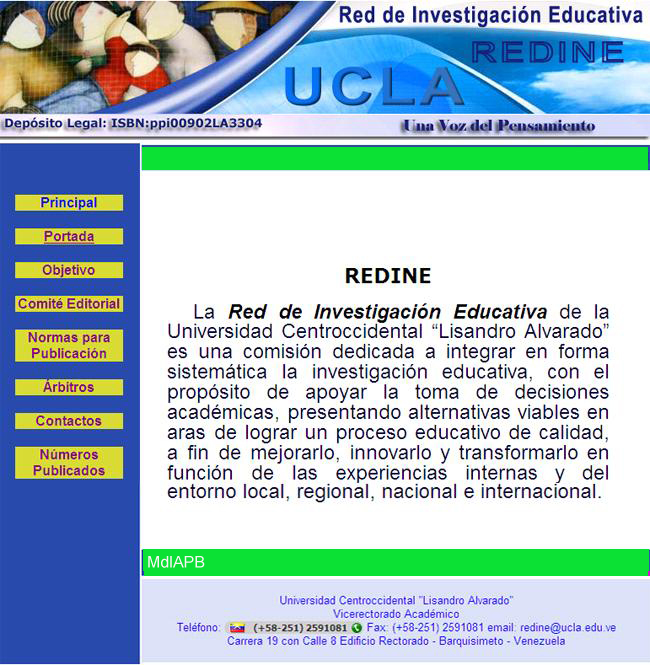problems and challenges of research in the 21st century. (the case of the riems and the conformation of the anthropico)
Keywords:
antropoética, investigation, RIEMS, competitions, cross streets, complexity, average top educationAbstract
The investigation(research) in the 21st century faces one without number of challenges and problems, in it(he, she) is century in which we live, the not alone challenge of the investigation(research) if not of the education, it(he, she) is that one must harmonize(reconcile) the matter and the spirit, the nature and the culture, the science and the humanities, propitiating(causing) a reunion between(among) the technology and the humanism, integrating(repaying) the memory(report) and the project. For it we believe that the new paradigm of the investigation (research) and education is the conformation of the antropoética. In this document we approach the problematics that represents the Integral Reform of the Average Top Education RIEMS(Educational policy adopted by the Federal Government to modify the Common Curricular Framework of the National Baccalaureate System (SNB) and which gives rise to agreement number 444, published on October 21, 2008 in the official newspaper of the Federation), not only for the investigation(research), but also for the process of conformation of the antropoética, for it his(her, your) conceptual terms(ends) are approached, since(as, like) antropoética, transverse competitions and the notions of conformation, complexity. We have selected the scene (stage) of the average top education, specifically the baccalaureate, for which it (he, she) is in this level of the education, where.
Downloads
References
Bourdieu, Pierre, Capital cultural, escuela y espacio social, Ed. Siglo XXI, México, 2000, pp. 208.
Comenius, Juan Amós, Didáctica magna¸ Ed. Porrúa, ed. 15ª, México, 2005, pp. 198.
Damm Arnal, Arturo, Libertad: esencia y existencia, Ed. Editora de Revistas S.A. de C.V. 2ª ed., México, 1989, pp. 104.
Chomsky, Noam, El nuevo orden mundial (y el viejo), Ed. Critica, Barcelona, España, 2004, pp. 386.
Guariglia, Osvaldo, Una Ética para el siglo XXI. Ética y derechos humanos en un tiempo posmetafísico , Ed. Fondo de Cultura Económica, México, 2006, pp. 159
Estrada, José Manuel (1987). Libertad de enseñanza En: Libertad responsable y educación: nuevos desafíos para el docente. Buenos Aires: Montserrat. pp. 327.
Foucault, Michel (2004). Vigilar y castigar (nacimiento de la prisión), Ed. Siglo Veintiuno Editores, S.A., México. pp. 314.
Gimeno Sacristán, José, Pérez Gómez, Angel I. (1997). Comprender y transformar la enseñanza, Ed. Ediciones Morata S.L., Madrid, España. pp. 201.
González Lucini, Fernando (2001). La educación como tarea humanizadora, (de la teoría pedagógica a la práctica educativa), Ed. Grupo Anaya S.A., Madrid, España, pp. 321.
González Lucini, Fernando (1995). Temas Transversales y Áreas Curriculares, Ed. Grupo Anaya S.A., Madrid, España, pp. 162.
Illich, Ivan, (2006). La sociedad desescolarizada¸ Ed. Fondo de Cultura Económica, México, pp. 64.
Latapi Sarre, Pablo (2002). La moral regresa a la escuela, Ed. Centro de Estudios de la Universidad, Plaza y Valdez Editores, Universidad Nacional Autónoma de México, México, pp. 150.
Latapi Sarre, Pablo (2004). El debate sobre los valores en la escuela mexicana, Ed. Fondo de Cultura Económica, México, pp. 236.
Llanes Tovar, Rafael (2001). Como enseñar y transmitir los valores: guía para padres y maestros, Ed. Trillas, México, pp. 197.
Mannheim, Karl (1987). Ideología y utopia. Introducción a la sociología del conocimiento, Ed. Fondo de Cultura Económica, México, pp. 453.
Morin, Edgar (2005). Introducción al pensamiento complejo, 8 ed., Ed. Gedisa, S.A., Barcelona, España, pp. 167.
Morin, Edgar (2001). El Método V. La humanidad de la humanidad: La identidad humana, Ed. Seuil, pp. 342.
Morin, Edgar (2000). Los siete saberes necesarios para una educación del futuro, UNESCO, pp. 109.
Ruiz, R., A. Argueta., A. Martínez, V. Corrales V. y B. Hernández (2006). Los estudios de posgrado en México: diagnóstico y perspectivas. UNESCO-IESALC, IPN; UNAM. UAS. (En Prensa).
Published
How to Cite
Issue
Section
Derechos del/de autor/es a partir del año de publicación
Esta obra está bajo la licencia:
Creative Commons Reconocimiento-NoComercial-CompartirIgual 4.0 Internacional (CC BY-NC-SA 4.0)
Las opiniones expresadas por los autores no necesariamente reflejan la postura del editor de la publicación ni de la UCLA. Se autoriza la reproducción total o parcial de los textos aquí publicados, siempre y cuando se cite la fuente completa y la dirección electrónica de esta revista. Los autores(as) tienen el derecho de utilizar sus artículos para cualquier propósito siempre y cuando se realice sin fines de lucro. Los autores(as) pueden publicar en internet o cualquier otro medio la versión final aprobada de su trabajo, luego que esta ha sido publicada en esta revista.




